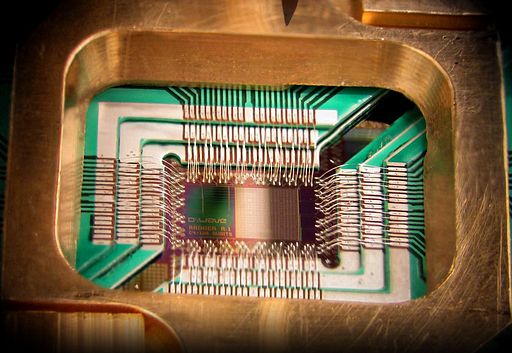A Quantum Conundrum

How secure do you feel on the internet? Like you’re dangling from a dangerously high precipice by the straps of your dungarees, while some piece of malevolent code holds scissors to the straps? Or perhaps like you’re curled up, warm and snug, under a blanket of encryption beside a crackling fire. For most of us, it’s somewhere in between these two extremes. However, new research from the University of New South Wales could mean that the online landscape might be about to become a lot less smooth.
The Australian research team say they have developed two new types of quantum bits, ‘qubits’, that perform operations with an accuracy of over 99%. Qubits are used in quantum computers to perform calculations. They can be made to take either take a ‘1’ or a ‘0’ value like classical bits. But, unlike classical bits, qubits are set up in a quantum state for whatever problem you want to solve. When the quantum state is ended, by observation or otherwise, each particle instantaneously takes either a ‘1’ or a ‘0’ value, giving an almost immediate answer. This is what gives a quantum computer its speed and operational power.
The problem so far has been that storing information over a period of time within qubits is very difficult. Previous attempts by the Australian team to store binary information on a qubit electron was lost very quickly due to magnetic ‘noise’ from the environment.
Now, the team have used an extremely purified and non-magnetic form of silicon, Si-28, to produce chips that will be used to contain qubits. When a qubit (such as a free electron held in place by magnets or an electron held by a phosphorus atom) is placed inside Si-28, the absence of magnetic noise means the storage and manipulation of the quantum state is highly accurate. Silicon is already used extensively by the electronics industry so this is wonderful news for the scalability of production of quantum computers.
Quantum computers are highly desirable because of their ability to solve complex problems that normal computers cannot. For example, quantum computers could be used to study the properties and interactions of atomic particles. This would be extremely useful in the field of drug discovery, where computer-aided design could be used to develop and simulate the effects of new drugs.
The downside is that quantum computers would be able to crack current public encryption keys, used to protect online data, billions of times faster than anything can presently. Changing to quantum cryptography is one solution to the problem, where photons in a quantum state carrying data encryption keys are sent between sender and receiver. If a third party observes the encryption keys, the quantum state is lost, which the receiver then picks up on. Of course this would require widespread changes to the online landscape – not an easy task.
Quantum computers are coming and their potential to do good is incredible, but like many great inventions, they may also be highly dangerous.
For more information, check out these YouTube videos on quantum computing!
[1] New world record set for silicon quantum computing
[2] How does a quantum computer work?
Edited by Debbie Nicol










